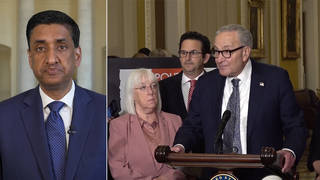
Guests
- Nick Estesa citizen of the Lower Brule Sioux Tribe and assistant professor of American studies at the University of New Mexico.
President Trump’s visit to Mount Rushmore comes after months of escalating coronavirus infections in Native communities, but Indigenous scholar and activist Nick Estes says South Dakota Governor Kristi Noem, like many of her Republican counterparts across the U.S., has taken a “hallucination-based approach to the COVID-19 pandemic,” and notes she refused to enforce social distancing at this weekend’s event that attracted thousands of people. He also reacts to growing pressure on the Washington R-dsk-ns and Cleveland Indians to change their racist names.
Transcript
AMY GOODMAN: This is Democracy Now! I’m Amy Goodman, The Quarantine Report, as we talk about Trump’s visit to Mount Rushmore and his visit to — and his White House event. The Rushmore event came [after] months of escalating coronavirus infections in Native communities. There was no social distancing. The governor proudly announced this. Seventy-five hundred people packed into the area under Mount Rushmore, and no one was required to wear masks.
Nick Estes is our guest, a citizen of the Lower Brule Sioux Tribe, assistant professor of American studies at the University of New Mexico.
In the last months, there has been a showdown between Indigenous leaders in South Dakota and a Trump ally, South Dakota Governor Noem, around the issue of COVID. Talk about how hard hit Indian Country is by the coronavirus, Nick.
NICK ESTES: Right. So, Kristi Noem, like many of her counterparts in the Republican Party, have taken a hallucination-based approach to the COVID-19 pandemic, believing that if they just stick to their conservative, right-wing values and blame somebody else, such as China or whatever, that this will be a — you know, this will just be like a headache, and it will go away after a while.
But tribes, you know, ironically enough, have taken a science-based approach. They believe the science, because they understand that Indian Health Services, or IHS, which are federal responsibilities by the federal government to provide Indian Health Services, because of treaties or other kinds of agreements, are chronically underfunded.
And in fact, on May 20th of this year, there were several — there were five tribal organizations that signed a letter to David Bernhardt, the secretary of interior — you know, he’s a former oil lobbyist — calling for the resignation of current Assistant Secretary of Indian Affairs Tara Sweeney over several things, but primarily what they view as the mishandling of the $8 billion that were allocated under the CARES Act money for tribal coronavirus relief. And what their claims kind of set out is that the federal government has used this particular moment as an opportunity to facilitate land grabs.
So, on one hand, the court denied the Mashpee — a federal court denied the Mashpee Wampanoag the right to restore their own homelands. That has since been reversed. But that was a process that was set in motion by Sweeney herself back in 2018. Her office also failed to protect the Tohono O’odham Nation’s burial and sacred sites from being destroyed by explosives to build Trump’s border wall, the construction of which, as we know, has continued unabated, despite the pandemic.
And meanwhile, the Interior Department also allowed for-profit Alaska Native corporations, many of which have investments in oil and gas industry, to seek payouts from the COVID-19 relief money reserved for tribal governments. So, it’s unclear how that determination was made, but it has been since ruled by the courts that Alaska Native corporations will receive tribal money.
But at the same time, the governor of South Dakota, Kristi Noem, is pushing for the TC Energy pipeline, the Keystone XL pipeline, to be constructed through tribal reservation lands. Meanwhile, the tribes themselves have set up health checkpoints. And it’s important to note that they’re not turning people away. They’re not armed checkpoints. You know, they’re just doing health and safety checkpoints for people coming on and off the reservation. And it’s an attempt to basically implement safety protocols that the state itself and Trump himself refuses to implement.
And this is all leading up to the construction of the Keystone XL pipeline. And while it’s been reported, and rightfully so, that this pipeline is bringing in thousands of outside workers, out-of-state workers, into these very precarious tribal communities, and there’s concern about man camps and the high rates of sexual violence, but now the threat has been doubled with the threat of spreading coronavirus to these already hard-hit tribal communities.
AMY GOODMAN: Interestingly, after enormous pressure, Dominion and Duke have announced they are ending the Atlantic Coast Pipeline. But I wanted to go, quickly, before we end, in this last minute, to the pressure on the Washington R-dsk-ns to change their racist name. I’m even sorry that I used the word on air. And I wanted to ask you about what that means. It’s often talked about as a change of heart. This one that FedEx is pushing for, they own the stadium. And the Cleveland Indians, the fact that the manager is now talking about changing that name. Again, of course, this all coming from enormous pressure from below for years.
NICK ESTES: Yeah, we really owe it to activists, such as Suzan Shown Harjo and Amanda Blackhorse, who have been at the forefront of this, facing not just racial discrimination from billionaire team owners, like Dan Snyder, who owns the Washington football team, but also sexist attacks against them because they’re Native American women. We can see this is tied into the kind of gendered violence that Native women face on a daily basis in this country.
And I’ll say, you know, whether it’s Suzan Shown Harjo or whether its Amanda Blackhorrse, they’re not just advocating for the changing of the names, right? We could see this in the Land O’Lakes butter maiden, who — you know, it was a joke going around Indian Country, where it’s like, “Well, they removed the Indian, but they kept the land,” right? So we’re actually talking about land back. We’re actually talking about upholding treaty rights for Indigenous people. And this is what these activists, primarily Indigenous women, have been advocating all along. So it’s an incredibly important step in the right direction.
AMY GOODMAN: And very quickly, Professor Estes, in Baltimore, the taking down of the Christopher Columbus statue and throwing him into the harbor. If you can, in a minute, tell us who Christopher Columbus was?
NICK ESTES: So, it’s really funny, because somebody like Trump said that Christopher Columbus represents the American dream, the beginning of the American dream. Christopher Columbus landed in a Caribbean island that he thought was India, and he thought it was his dying breath. And he never stepped foot on the continent that later became the United States of America.
So, why he’s celebrated as a figure has to do with the fact that he enslaved, raped and tortured Indigenous people, and he himself was a genocider. And that’s the legacy that somebody like Trump wants to uphold when he’s creating these monument statues or he’s issuing executive orders for the protection of the so-called heritage of this country. It’s a heritage of conquest and theft.
AMY GOODMAN: Nick Estes, I want to thank you for being with us, citizen of the Lower Brule Sioux Tribe, assistant professor of American studies at the University of New Mexico, speaking to us from Albuquerque.
We come back, go to Egypt for an exclusive interview. Stay with us.
[break]
AMY GOODMAN: Ennio Morricone’s “Theme of Ali” from The Battle of Algiers. Morricone passed away today at the age of 91.











Media Options